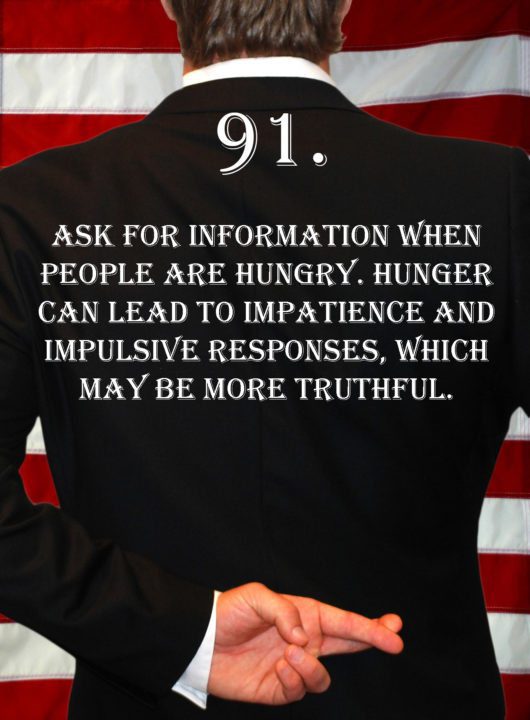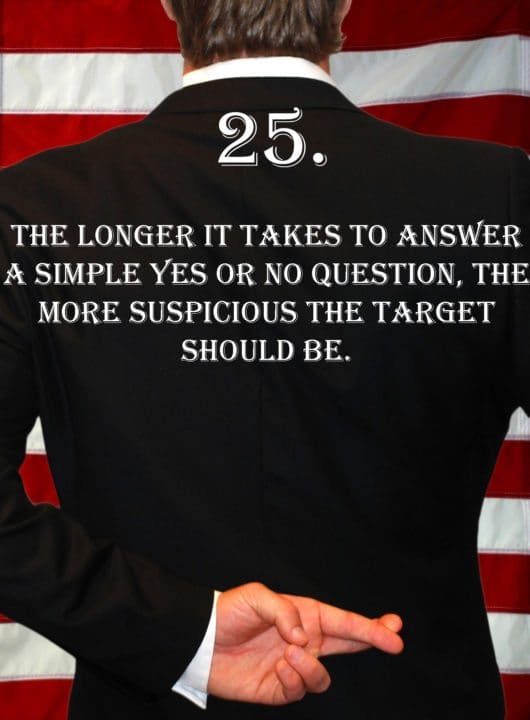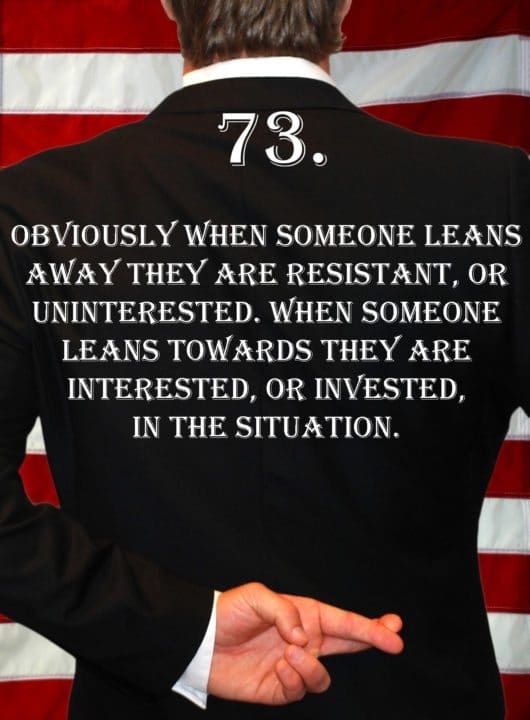
Deception Tip 91:
Ask for information when people are hungry. Hunger can lead to impatience and impulsive responses, which may be more truthful.
Listen To The Podcast!
E91 – Hunger – Deception Tips Podcast – Click Here To Subscribe
Podcast Transcript
Hello and welcome to the Deception Tips podcast where you will learn amazing cues to detect deceit that will help you read people like never before. I’m your host Spencer Coffman, let’s get started.
Hello and welcome to episode 91 of the Deception Tips podcast. Last week, we talked about an important tip, about getting facts wrong and how you can use getting things incorrect to your advantage.
Now, that doesn’t mean that you think that they are wrong, you are doing something where you’re pretending to have the story wrong.
You know what the truth is, you know what you understand but you are going to misinterpret or put a different light on some facts or different parts of their story in an effort to get them to be a little bit more frustrated.
They’re going to feel like they have to correct you, they want to tell you the truth. Remember, it’s important to do this with people who are showing you signs of confidence, overconfidence, superiority, or pride.
They’re leaning back in their chair, their feet are up, maybe they’re steepling their fingers, they have their hands behind their head. Different behaviors that show you that they think they’re superior, that they’ve started to fool you, that they are about to get away with their lie. You can become a little bit of a nitwit or an inspector Clouseau and you can ask them different questions.
Say, okay, I think I understand, and give them their story and screw up on a few key details or add something in that doesn’t belong. Say they went somewhere they didn’t or at a different time, screw up on some of those things and they will feel like they need to correct you.
Obviously, it’s not going to happen all the time but some of the time it will. When they correct you, you’re going to be able to see the different holes in their stories or the different contradictions.
You’ll be able to watch their body language again in that area. So, make sure you mess up on the spots that you are pretty sure they’re lying about to try to get them to show you some more unconscious signs of deception.
There’s a big battle going on between the conscious and the unconscious and when you start to do things like this, they’re already a little bit frustrated and tense. Now you’re pushing them off the cliff or you’re poking them with a needle to get them closer and closer to the edge.
They will eventually snap or blow up or something’s going to happen where you will receive a big outburst of different information and facts, hopefully, it becomes to be the truth.
So, that is exactly what we talked about last week. If you didn’t listen to the episode, I encourage you to do so. I also encourage you to check out the video for a little quick five-minute recap. It’s not even a recap, it’s an entirely different speech, audio or visual, or talk on this topic.
Today, we’re talking about a deception tip that is one that you’ve no doubt experienced yourself. It’s actually a play on a feeling and it’s always going to work on everybody. Just like all of these other tips, they’re universal but this one is even more so because this is a feeling that everybody experiences. Every single person in the world experiences this exact same feeling.
I’m not talking about a feeling like sadness or love or happiness or anything like that because believe it or not, there are some rare cases of people that may never really experience those or one of them.
If they do, they may experience them in a different way than someone else. However, this is the exact same, it’s the exact same across everybody. If you’ve read the title you know what this feeling is, this feeling is hunger.
Everyone has been hungry at some point in his or her life. I don’t mean hungry as in starving, I mean like between lunch and supper, all of a sudden, your stomach is growling and you’re hungry.
What usually happens when you get hungry, is a lot of people start to become a little bit angry or irritable, they also may become impatient or tense. Remember what happens when people tell a lie, they’re stressed and tense because of the battle going on between the conscious and the unconscious.
So, if they’re hungry, that goes up, even more, they’re going to be even more stressed and tense. Therefore, speaking to someone when he or she is hungry can either be really helpful or really negative.
Either they’re going to help you and just tell it to get it out so they can eat or they’re not going to tell you anything because they’re hungry and they’re irritated and upset.
So, here it is, this is Deception Tip number 91. Ask for information when people are hungry. Hunger can lead to impatience and impulsive responses which may be more truthful. Here it is again, Deception Tip number 91. Ask for information when people are hungry. Hunger can lead to impatience and impulsive responses which may be more truthful.
So, as I said, when people are hungry, they are not thinking as clearly as they would be when they’re full. They’re usually focused on finding something to eat or on their stomach, they’re thinking about their hunger, they are hungry, they want to satisfy that hunger. Therefore, when you are asking them for information, they are really thinking about your answers.
They’re not thinking about their response fully, they’re not fully thinking about it, so if they’re lying and they’re being deceptive, that requires a lot of thought. They need to keep the lie straight, they need to make sure they tell it the same every single time. They also need to make sure that they are using the same words, and the same sentences. All this stuff goes into telling their lie over and over for other people to hear it.
When they’re hungry, they may not be thinking as much about their lie because they are thinking about their hunger, they want to eat. Therefore, if you start asking people more information when they’re hungry, they may be more apt to tell you the truth because they’re not thinking about their lie, they’re going to slip up. Of course, it’s not always, but it’s a good chance.
In addition, when people are hungry, they also may become angry. There’s a very famous commercial out there, ‘hungry, grab a…’ you know what it is. I’m not going to do any advertising for them for free but you know the commercials, so I just did. When people are hungry, they’re not themselves. We’re going to talk a lot more about that coming up right after this.
How would you like to really know what every body is saying? Understanding body language can help you in your career, your relationships, and in everyday interactions. Subscribe to the Deception Tips email on spencercoffman.com today.
Welcome back to Deception Tip episode number 91 where we are talking about hunger and the effect it has when people are telling lies. Usually, when someone’s hungry, they are thinking about their hunger and when someone is lying, they are thinking about their lie.
Therefore, if you put those two combinations together, someone is lying and they’re hungry, now they’re thinking about all of the stress and tension involved in telling a lie.
Plus, they’re thinking about hunger and eating and food and whatever they can do to satisfy that, so they have two competing desires. Usually, when the human brain has two competing desires, one is going to trump the other.
Generally, in this circumstance, hunger will probably trump their lie because the lie is not true, so it’s not that important. However, if they’re fighting for truth, they’re probably going to keep fighting for that truth and hunger isn’t going to matter to them. In this instance, when someone is lying, that hunger is going to overwhelm that lie.
Therefore, if you start asking them more and more questions when they’re hungry when they’re starting to become stressed, frustrated, and tense on top of the lie. So, that’s even beyond telling the lie or the stress and tension involved in the lie, they will be more apt to tell you what you want to hear and what you want to know.
The reason is that that hunger and that thought of hunger and everything is going to overpower the lying tendencies and thoughts and behaviors because one will trump the other. They will start to be thinking more about food, and how they can get food. They realize that if they answer your questions and satisfy you, they can leave and go eat, or maybe you’ve offered to get them a cheeseburger or something afterward.
Use that to your advantage, ask some questions but be on the lookout for answers that you want to hear or things they think you’re looking for because they may say anything in order to get food or get away from you. You have to sift out that too because there could be a lot of nonsense thrown in there.
If they are really hungry, they may just be telling you what you want to hear or what they think you want to hear, that way, they can get on with their lives and get some food. However, you should sift through that, you’re going to pay attention to all the different signs of deception that you’ve learned. You’ll know whether or not they’re lying even more or whether they’ve started to tell you the truth.
A lot of times when people are hungry they may slip up and they’re going to just tell you the truth by accident. It’ll be more of they are telling their lie and then they get hungry and you keep asking them and they’re going to tell you they’re hungry or you’re going to know. They’re going to become a little bit more irritable and frustrated as we’ve said before.
When you’re asking these questions, you’re going to notice that they may give a different response. They’re not intentionally giving a different response, this is a slip-up, it’s a contradiction. You’re going to start watching for contradictory statements, gestures, behaviors, everything.
Chances are their first story is going to be one way and when they are hungry and you’re asking them again, that second story may be different. So, you need to find the holes between those stories, you need to find out where they’ve messed up and then you’re going to call them out on those specific instances.
When they explain those instances, you need to be watching very, very carefully for additional signs of deception. You want to establish a pattern and a cluster of behaviors in those little circumstances when they’re explaining those loopholes because then you will be able to find the differences in their stories.
You’ll be able to call them out on those lies and then you will see whether or not their explanation is indeed true and where they’re lying. It’s a multifaceted strategy here, you’re going to talk to them, you’re going to talk to them again when they’re hungry. You need to find the loopholes, the differences, you’re going to meticulously sift through and ask them specific questions about each spot.
This isn’t open-ended questions, it’s not ‘explain this and this’, you’re going to start asking ‘yes’ and ‘no’ questions because that is much easier for you to determine whether or not they’re going to tell a lie. Remember a long time ago we talked about ‘Yes’ and ‘No’ and we said that a ‘yes’ or ‘no’ question is simply that, the answer is ‘yes’ or ‘no’.
Therefore, if anyone explains anything then that’s really weird because there’s no reason to, it’s a ‘yes’ or ‘no’ question, and the answer should be ‘yes’ or ‘no’. If they feel like they need to keep explaining, then something is definitely going on. That was episode 25, where we talked about ‘Yes’ or ‘No’.
It is important to ask them these ‘yes’ or ‘no’ questions because if they do try to explain stuff then you’ll know that something more is going on. Maybe they just want to defend their position or give you more information and that’s fine but in general, a ‘yes’ or ‘no’ question should always be answered with ‘yes’ or ‘no’. Therefore, use them to your advantage when you start to pick apart these different holes in their stories.
Use the other strategies and tactics that you have learned throughout the Deception Tips podcast. Things like Relating Language and making sure that you guys are on the same page or that they think they relate to you, now they’re even more apt to open up, that was in episode 84.
Another good one that you could use or certain things like Rephrasing the Questions. If they ask you to rephrase your question or if they even rephrase the question themselves and then answer it, you know that there’s something going on.
It’s like a stalling tactic or a delaying tactic in their explanation, that was episode 64. Those different things that you’ll be able to pick up on are important in this step because now you’ve started to dig in a little bit deeper.
Another one would be Repeating the Question, which was episode 43. So, once you start to dig deeper, you’re peeling back the inner layers and they will start to exhibit a lot more of these signs because they may not know what you’re doing or they may not know why you’re doing it. Remember, they’re frustrated because they’re hungry, so that adds an entire level of extra stuff that you can use to your advantage.
So, I want to thank you for listening to this week’s episode of the deception tips podcast. I hope that you’ll share it with your friends, subscribe to the feed, check out the Deception Tips videos, the blog and take a look at the books I have available, and, as always, tune in next week for a new deception tip.
Video Transcript
Hey guys, my name is Spencer Coffman, thank you for watching the deception tips videos. They’re all about teaching you how to read people and detect deception so that you’ll be able to tell if someone is lying to you. Today, we’re going to talk about a technique that you can use, it’s more of a state of being that you can use to get the truth out of someone.
It’s not your state of being, it’s someone else’s, it’s a technique that’s been used for ages, cops use it all the time, police officers, law enforcement personnel. It could be a little controversial because you’re playing on something that someone else can’t really help, it’s like a predator going after the prey. It’s a technique that you can use and feel free to use it because if someone is lying, you need the truth.
So, here it is, this is Deception Tip number 91. Ask for information when people are hungry. Hunger can lead to impatience and impulsive responses which may be more truthful. As I said, this is taking advantage of a certain position that someone is in, so it is a little bit controversial. However, lying is wrong, so if someone is lying and you use a little controversy to get the truth, what are you going to do?
So, hunger can lead to impatience and more impulsive responses. Why? It is because people are hungry, you’re not you when you’re hungry. Oftentimes though, so this is a little bit of a warning as people can get angry when they’re hungry or irritated, more irritable anger so watch for that. Sometimes their responses and impulsivity may just be in that anger because they’re hungry.
It’s also a good thing to watch for if all of a sudden, like if you have kids and you notice they might be getting a little cranky, maybe they’re hungry, you never know. So, find that out, it’s just like a little tip that you can use in your relationships and your family that maybe someone is hungry, so solve that problem first and move on.
Also, it’s very important that if people are getting a little bit impulsive or impatient and they’re giving you quick answers, it may not be because they’re lying, it may simply be because they’re hungry. So, you need to make sure that when you are talking to someone that if you’re trying to find the truth, you can use their hunger as an advantage to get them a little more irritated or a little more tension bubbling up inside of them.
When they’re lying, they’re already stressed and tense and when they’re hungry, now they’re going to be stressed and tense even more. So, use that to your advantage when you are speaking with them if in fact that hunger is a part of the conversation. That’s important because, as I said, keep in mind, they are lying, so you’re not really doing something that’s pushing beyond the limits.
However, sometimes in police interrogations, you see this in movies or even in real-life cases where the police officers are interrogating the suspect for hours on end. After 13 hours or 15 hours or however long that they’ve had them sitting in that little room, they haven’t had anything to drink. They haven’t had anything to eat, they’re so hungry, they’re so tired, they’re so thirsty and the police officers use it as an advantage.
Well, if you confess, we’ll get you something to eat or you confess we’ll get you some water. Then eventually the person does and then they serve them. Well, now it’s been taken too far. So, it’s one thing to use it to your advantage, to get a response, it’s another to make it your advantage and that’s the difference right there.
So, if this is your first time watching these videos, I’d love to have you subscribe to the channel on YouTube. Feel free to comment with any questions you may have. Also, if you’d like some more information, we have books, podcasts, and blog posts all available on spencercoffman.com that are dedicated to teaching you exactly what every body is really saying.
Until next time.






